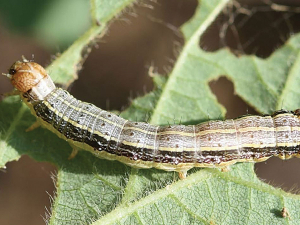NZ Catchment Groups Thrive with ‘Source to Sea’ Approach
The most successful catchment groups in NZ are those that have 'a source to sea' approach.
 Fall armyworm is believed to have blown over to New Zealand from Australia after a cyclone in early 2022.
Fall armyworm is believed to have blown over to New Zealand from Australia after a cyclone in early 2022.
The Ministry for Primary Industries (MPI) is investing in the development of an integrated pest management approach to safeguard New Zealand’s maize and sweetcorn industries against fall armyworm.
MPI will contribute up to $300,000 over three years to the $630,000 project through the Sustainable Food and Fibre Futures fund.
“We’re collaborating with the Foundation for Arable Research, Process Vegetables NZ, Vegetables NZ Inc, and growers on management and mitigation strategies to help reduce production losses and enhance resilience to this invasive pest,” says Biosecurity New Zealand deputy director-general Stuart Anderson.
“Together we’ll develop some really good tools for growers, including establishing surveillance networks on a national scale.”
Fall armyworm is believed to have blown over to New Zealand from Australia after a cyclone in early 2022. After a year of battling the pest, MPI and industry partners agreed to close the response and shift the focus to longterm management of the pest by industry. Fall armyworm has the potential to impact 72,490 hectares of maize, with an estimated value of more than $480 million and 3320 hectares of sweetcorn production, with an export value of $36.9 million.
“We don’t know what the full impact of the fall armyworm incursion will be in the future as it depends largely on our winter temperatures and suitable host plants in the absence of maize and sweetcorn,” says Ashley Mills, biosecurity officer, Foundation for Arable Research (FAR).
“For instance, in areas with warmer winter temperatures such as Northland, the insect has the capacity to overwinter and survive all year round. With warming temperatures, we might expect the problem to grow year on year.
“Part of our research will be to identify gaps of knowledge around the winter growing season and dispersal of fall armyworm.
“We’ll produce models and come up with early warning tools for agronomists and growers, so they understand when they need to employ their most intensive management strategies.
“There’s no one-sizefits- all solution, and approaches may vary according to factors such as region, climate or soil type. In most cases, encouraging beneficial insects will work, but in more problematic regions or localities, insecticides might be needed, and the timing of application will be important.
“Over the next 3 years we’ll focus on understanding fall armyworm phenology and distribution, developing New Zealand specific economic thresholds and finding long-term solutions that reduce reliance on agrichemicals, and preserve soil health, water quality and biodiversity.”
FAR and Vegetables NZ Inc will host information and tools for fall armyworm management on their websites. This will include modelling, distribution maps, guidelines, and training videos. FAR will also host workshops over winter, tailored to each region.
Anderson says engagement with growers will be an essential part of the programme.
“Ultimately, it’s the growers that will need to implement the strategies and use the tools. This project aims to make these easily available for everyone to use.”
New Zealand and Chile have signed a new arrangement designed to boost agricultural cooperation and drive sector success.
New DairyNZ research will help farmers mitigate the impacts of heat stress on herds in high-risk regions of the country.
Budou are being picked now in Bridge Pā, the most intense and exciting time of the year for the Greencollar team – and the harvest of the finest eating grapes is weeks earlier than expected.
The Real Estate Institute of New Zealand (REINZ) has released its latest rural property report, providing a detailed view of New Zealand’s rural real estate market for the 12 months ending December 2025.
Rural retailer Farmlands has released it's latest round of half-year results, labeling it as evidence that its five-year strategy is delivering on financial performance and better value for members.
OPINION: "We are back to where we were a year ago," according to a leading banking analyst in the UK, referring to US president Donald Trump's latest imposition of a global 10% tariff on all exports into the US.

OPINION: A mate of yours truly reckons rural Manawatu families are the latest to suffer under what he calls the…
OPINION: If old Winston Peters thinks building trade relations with new nations, such as India, isn't a necessary investment in…